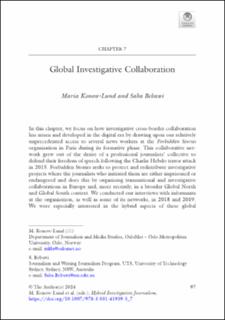Global Investigative Collaboration
Abstract
In this chapter, we focus on how investigative cross-border collaboration has arisen and developed in the digital era by drawing upon our relatively unprecedented access to several news workers at the Forbidden Stories organisation in Paris during its formative phase. This collaborative network grew out of the desire of a professional journalists’ collective to defend their freedom of speech following the Charlie Hebdo terror attack in 2015. Forbidden Stories seeks to protect and redistribute investigative projects where the journalists who initiated them are either imprisoned or endangered and does this by organising transnational and investigative collaborations in Europe and, more recently, in a broader Global North and Global South context. We conducted our interviews with informants at the organisation, as well as some of its networks, in 2018 and 2019. We were especially interested in the hybrid aspects of these global collaborations with respect to technology, culture-specific modes of communication, and professional practices and standards. Rather than perpetuating the fraught divide and binaries between ‘mainstream and alternative, digital and non- or pre-digital journalism’ (Witschge et al., 2016, p. 2), we studied the ways in which they mixed and combined various methods that led to the common goal of holding power to account around the world.

